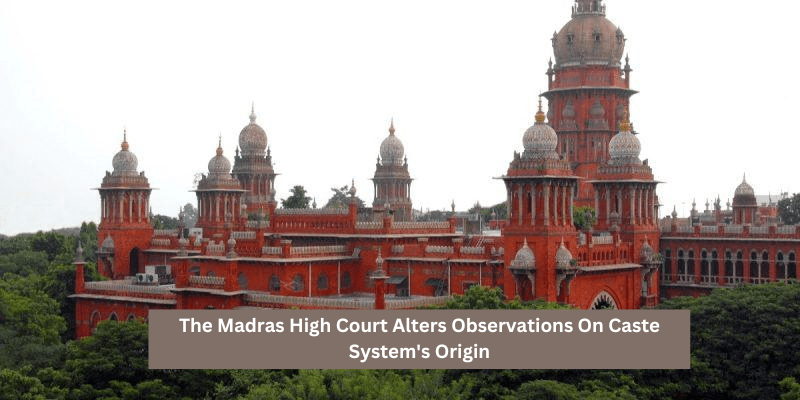Madras High Court Alters Observations On Caste System’s Origin: A Closer Look

Introduction:
In the aftermath of the Madras High Court’s judgment on petitions filed by the Hindu Munnani against Tamil Nadu ministers Udhayanidhi Stalin, a member of the Dravida Munnetra Kazhagam (DMK), and P.K. Sekarbabu, along with Nilgiris MP A. Raja, concerning their remarks on Sanatana Dharma during a conference in 2023, a series of corrections made by Justice Anita Sumanth have come to light. These revisions, introduced just two days after the verdict was pronounced, have ignited debates regarding judicial process and interpretation.
Table of Contents
The Controversy Unveiled:
On March 6, a single judge’s judgment was first made public, which included contentious remarks on the historical roots of the caste system.
The initial version posted on the website stated:[1]
“The origins of the caste system as we know it today are less than a century old. The State of Tamil Nadu has 370 registered castes, and the State is a cacophony of pulls and pressures by groups of persons claiming allegiance to one caste or the other.”
The initial statement suggested that the caste system, as known today, is not more than a century old.
It was subsequently amended to:[2]
“The categorisation of castes as we know them today, is a far more recent and modern phenomenon. The State of Tamil Nadu has 184 registered castes, and the State is a cacophony of pulls and pressures by groups of persons claiming allegiance to one caste or the other.”
The revised version of the ruling later emphasized that the classification of castes, as understood presently, is a relatively modern phenomenon.
Judicial Deliberation And Insights:
Justice Anita Sumanth, while condemning Stalin’s remarks as divisive and contrary to constitutional principles, refrained from compelling his dismissal. The court’s nuanced approach underscores the complexity of historical interpretations and the importance of upholding constitutional values.
Delving into the origins of the caste system, the court emphasized that while inequalities rooted in caste endure, the classification of castes in their modern form is a recent phenomenon. This acknowledgment challenges traditional perceptions and emphasizes the necessity for nuanced historical scrutiny.
Scrutinizing Scholarly Analysis
Another area of contention stemmed from the court’s reliance on a study conducted by experts at Chennai’s Kuppuswami Sastri Research Institute. Initially, the judgment suggested that the study affirmed the phrase “Sanatana Dharma” to connote high moral values and virtuous living, without association to the Varna system. However, a careful correction added the word “only,” indicating a more cautious interpretation of the research findings.
And Societal Reflections:
The High Court’s decision not to remove the ministers from their positions emphasizes the complexities of navigating political and social landscapes. While condemning divisive rhetoric, the court refrained from overstepping its judicial mandate, highlighting the delicate balance between upholding constitutional values, and respecting democratic processes.
The controversy surrounding Stalin’s remarks reflects broader societal tensions and the challenges of reconciling diverse perspectives within a pluralistic society. The court’s intervention serves as a reminder of the judiciary’s role in safeguarding constitutional principles while promoting dialogue and reconciliation.
Reflections On Caste Dynamics:
One of the judge’s crucial observations linked caste-based fervor to the benefits individuals receive, prompting questions about the ancient Varna system’s culpability. While this statement remains unchanged in the revised judgment, its implications continue to fuel discussions on societal dynamics and historical legacies.
Conclusion:
The Madras High Court’s revision of its observations on the caste system’s origin offers valuable insights into the intricacies of historical narratives and societal dynamics. By accenting the modernity of the caste system, the court prompts a reexamination of entrenched beliefs and encourages informed discourse on issues of social justice and equality.
In navigating complex societal issues, it is imperative for all stakeholders to engage in constructive dialogue and uphold the principles of mutual respect and understanding. While the court’s intervention provides a legal framework for addressing contentious issues, the responsibility lies with society as a whole to foster inclusivity and promote harmony.
[1] https://ksandk.com/wp-content/uploads/2024/03/downloaded-5-526560.pdf
[2] https://ksandk.com/wp-content/uploads/2024/03/kishore-kumar-v-sekar-babu-526957.pdf
King Stubb & Kasiva,
Advocates & Attorneys
New Delhi | Mumbai | Bangalore | Chennai | Hyderabad | Mangalore | Pune | Kochi | Kolkata
Tel: +91 11 41032969 | Email: info@ksandk.com
By entering the email address you agree to our Privacy Policy.